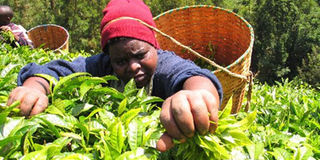Tea production hard hit by adverse weather

FILE | NATION. Cecily Muriuki picks tea at Kahuru village in Mathira, Nyeri County, June 17, 2011.
Tea production has dropped by a quarter in the first five months of the year compared to a similar period last year.
Data from the Tea Board of Kenya, the industry regulator, shows that the output between January and May 2011 fell to 149.5 million kilogrammes from 183.1 million kilogrammes recorded during the same period last year.
And adverse weather is to blame for the problem in one of the country’s top foreign exchange earners.
On a month-on-month basis, the tea board’s managing director, Mrs Sicily Kariuki, said the country produced 32.8 million kilogrammes last month a seven per cent drop from the 35.6 million kilogrammes harvested in May 2010.
Highly depressed
“Lower production was largely attributed to depressed and poorly distributed rainfall patterns experienced in most tea growing areas during the month of May,” said Mrs Kariuki in a statement.
This is confirmed by the Kenya Meteorological Department, which says the March to May 2011 seasonal rainfall was highly depressed and poorly distributed, both in time and space over most parts of the country.
“The poor rainfall performance impacted negatively on the agricultural and pastoral activities in various parts of the country,” the department says in its latest report.
Areas west of Rift Valley were the most affected with tea output dropping by 9.1 per cent from 21.3 million kilogrammes recorded in May 2010 to 19.3 million kilogrammes.
Significant drop
Those in the east of Rift Valley saw production falling by 5.6 per cent from 14.2 million kilogrammes in May last year to 13.4 million kilogrammes this year.
Compared to last year, last month’s tea output within smallholder sub-sector decreased by 6.8 per cent to 19.5 million kilogrammes while that of the plantation sub-sector recorded a 9.1 per cent decrease to 13.3 million kilogrammes.
A significant drop in the full-year tea production, however, if not cushioned by a rise in prices, is bad news for the country.




